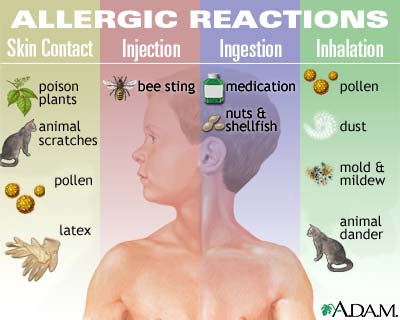What causes allergies? This question has been bothering many individuals as they age and the possibility that they may have a family history of allergic reactions to certain types of foods or other substances is real. Allergies are usually defined as an exaggerated reaction in the body to allergens (all substances with which the body has an intolerance) and environmental compounds that can cause contact dermatitis or allergic rhinitis. Food allergies often involve the reaction of the gastrointestinal tract and the skin, although other substances such as plastics, preservatives, antibiotics and others may also cause allergic reactions.
There are many different forms of treatment for allergies including antihistamines, corticosteroids, allergy shots, anti-histamines, leukotriene modifiers, and anti-histamine pills. Most individuals will try to avoid the allergen(s) by avoiding the allergen or taking the appropriate measures to avoid exposure. However, some allergies are extremely difficult to control and it may sometimes become impossible to avoid exposure. If this happens to you, then you should seek medical advice immediately. Your doctor will be able to recommend the most effective form of treatment for your particular type of allergy.
Anti-allergens are the most common medicine prescribed for allergic reactions. These medicines work by blocking the reaction of the body to the specific allergen or allergens. These substances include pollens, mould, pollen and many other airborne allergens which can be very harmful if inhaled. The most commonly prescribed anti-allergens are inhaled steroids, which have a long-term effect and are also relatively safe. Many doctors will also prescribe antihistamines to control allergy symptoms and they are fast acting and should only be taken for short periods of time.
Allergic reactions can be caused by any number of things which are known to cause allergic reactions. Some of these factors include: insect bites, dust mites, pollens, chemicals, food, hormones, and plastics. However, there are also other factors that can trigger allergies. For example, the common cold virus and the herpes simplex virus can cause a host of symptoms including flu-like symptoms.
To understand what causes allergies one must be aware of the different types of allergic reactions. These include eye symptoms like itching, redness, swelling and tearing. They can also include skin rashes, hives and more serious signs such as asthma. Nasal symptoms are often seen in children and can include the common runny nose and coughing. More serious allergy symptoms include eczema, inflammation of the respiratory tract, swelling of the eyelids and lips, nausea and vomiting and swelling of the throat.
While there is no absolute cure for allergies, there are a number of treatments available. In order to control symptoms, patients are usually given anti-allergy shots, which are quick and effective. These medicines stop the reaction and help protect the individual from infections. There are also a number of prescribed medicines which can help to reduce the severity of allergies. However, the best way to curb the problem of allergies is to avoid all allergens and use only branded medicines.




